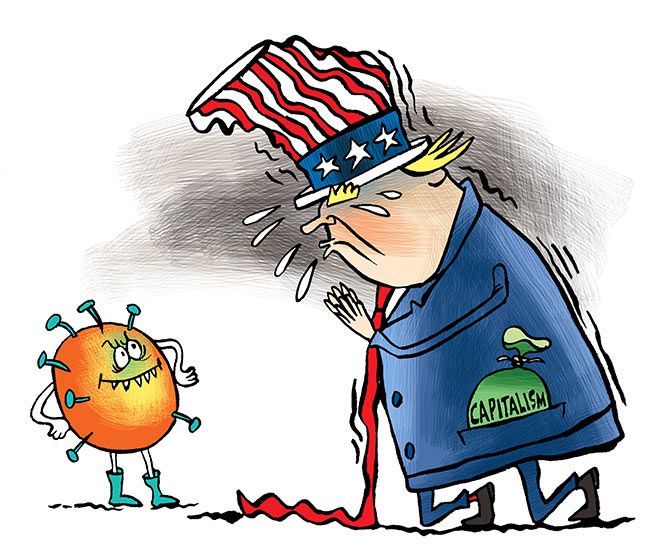 | « Back to article | Print this article |
Has Modi -- after announcing the life-crushing demonetisation, the abrogation of Article 370 and the CAA/NPR/NRC without any consultation -- suddenly realised the value of taking everyone on board, asks Krishna Prasad.
Illustrations: Uttam Ghosh/Rediff.com

Across the world -- from Britain to Israel, Chile to Bolivia, Hungary to Philippines -- political analysts and academics are horrified at the powers elected leaders are accumulating under the cover of #COVID-19 to detain people, close borders, shut down courts, surveil people, prevent assembly and so on.
Some of these steps are understandable in the circumstances, but many of the new powers have little to do with the outbreak.

In many nations, populist leaders have doused themselves in teflon, and convinced the people that their policies are beyond scrutiny and criticism; that the normal rules of politics do not apply at a time like this; that accountability and transparency need to be suspended for some indeterminate period.
In the name of 'national interest', of course.
As Anne Applebaum wrote in The Atlantic (external link): 'The opposite is true: All of the decisions being made right now, whether medical or economic, deserve widespread scrutiny and debate. As Francis Fukuyama has written (external link), there is no evidence that authoritarians are better than others at controlling disease; several democracies -- South Korea, Taiwan, Japan, and perhaps Germany -- look like they have control of their coronavirus outbreaks. Nor does any evidence show that secrecy produces better outcomes; quite the contrary.'
The saga is not much different in India, which has, of course, been there and done all that in the last 70 months, but there is a twist in the tale.
The twist being this:
After six years of untrammelled exercise of authority, Narendra Damodardas Modi suddenly appears to have discovered ever so slightly that there may be, just may be, some virtue in what little democracy is still left in the country.
In the last 15 days, the prime minister has addressed the country 5 times: On March 19 (when he imposed a #JanataCurfew); March 22 (when he announced #ThaaliBajao); March 24 (when he announced a 21-day lockdown); March 29 (Mann ki Baat); and April 3 (to ask people to light lamps).
In the last 15 days, the prime minister has had 'interactions' via video with representatives of industry; representatives of electronic media; representatives of print media; with radio jockeys, and with 'eminent sportspersons'.
In the last 15 days, he has had 'interactions' via video with chief ministers of states; with SAARC leaders; with leaders of G-20 countries; with heads of Indian missions broad; with members of his own ministry.
And, in the last 15 days, the honourable Member of Parliament from the Lok Sabha constituency of Varanasi had an 'interaction' with his constituents, again by video. And, in addition, addressed BJP workers by video on the party's 40th anniversary.

The uncharitable way of looking at these 'interactions' is to see them merely as photo-opportunities grabbed by a publicity-hungry, image-conscious leader starved of his oxygen by the advertised benefits of 'social distancing'.
The official photographs of these 'interactions' back this somewhat, for it is Modi who is mostly doing the talking and gesticulating in them whereas it should have struck him by now that he has spoken more than enough and needs to listen a lot more.
But that would be quibbling.
The point to ponder, therefore, is whether Modi -- after announcing the life-crushing demonetisation, the abrogation of Article 370 and the CAA/NPR/NRC without any consultation -- has suddenly realised the value of taking everyone on board.
Tuesday's Deccan Chronicle broaches this point in an excellent editorial: 'Meet PM Narendra Modi, suddenly a consensus builder' (external link).

There are other signals in the last few days which suggest that Modi has seized the opportunity offered by coronavirus to take a different tack, if not craft for himself a new not-the autocrat, not-the-authoritarian persona.
Suddenly, The Supreme Leader who had been strutting all over as if he knew it all and done it all, and who didn't brook the thought of anybody else possessing any wisdom, is reaching out to all and sundry.
Suddenly, CMs are being advised to charter their own timeframe to lift the 21-day lockdown, in imposing which they had no freedom.
Suddenly, IAS officers who had been emasculated wholesale, are finding the nerve to leak their feedback to the PMO that the 'lockdown' should be extended.
Perhaps, a puny pathogen can bring the most powerful to their knees.
Perhaps, an intimation of mortality can puncture puffed-up egos.
Perhaps, it is best to corporatise the profits and socialise the losses.
Perhaps, democracy has its uses after all.
Perhaps, this too is a put-on.
Krishna Prasad is former editor-in-chief, Outlook, and former member, Press Council of India.